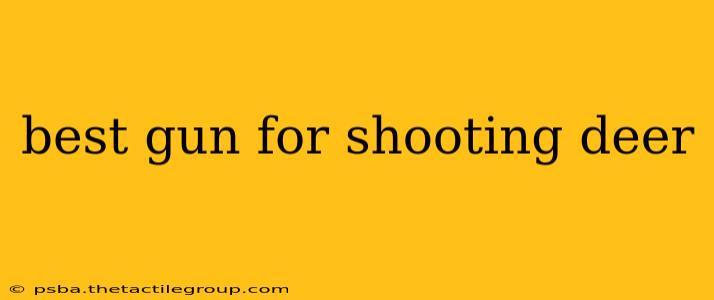Choosing the right firearm for deer hunting is a crucial decision impacting your success and safety. This isn't a simple "one-size-fits-all" answer, as the ideal gun depends heavily on factors like hunting style, terrain, personal preference, and the specific regulations in your hunting area. This guide will help you navigate the options and choose the best gun for your deer hunting needs.
Understanding the Key Factors
Before diving into specific firearms, let's consider the critical factors influencing your choice:
1. Caliber and Cartridge:
The caliber refers to the diameter of the bullet, while the cartridge encompasses the entire ammunition round. Different calibers offer varying levels of power and range. Popular choices for deer hunting include:
- .30-06 Springfield: A classic, powerful cartridge offering excellent accuracy and stopping power at longer ranges. A versatile choice for various hunting situations.
- .308 Winchester (7.62x51mm): A slightly smaller, more manageable cartridge than the .30-06, still delivering impressive energy and accuracy. Often preferred for its lighter recoil.
- .270 Winchester: Known for its flat trajectory and accuracy, making it suitable for longer shots. A good balance between power and recoil.
- 6.5 Creedmoor: A relatively newer cartridge gaining popularity, renowned for its accuracy, low recoil, and impressive ballistic performance.
- .243 Winchester: A lighter-recoiling cartridge ideal for beginners or those hunting in tighter quarters. Effective at moderate ranges.
Choosing the right caliber involves balancing power, accuracy, range, and recoil management. A more powerful cartridge might be necessary for longer shots or tougher terrain, while a lighter cartridge can be advantageous for easier handling and reduced fatigue.
2. Rifle Type:
The type of rifle also plays a significant role:
- Bolt-Action Rifles: Known for their accuracy and reliability, bolt-action rifles are a popular choice for deer hunting. They require a more deliberate shot, making them suitable for hunters prioritizing precision.
- Semi-Automatic Rifles: These rifles offer faster follow-up shots, which can be advantageous in situations requiring quick reactions. However, they generally have a higher recoil and require more practice to master accuracy.
- Lever-Action Rifles: Historically popular, lever-action rifles offer quick reloading and are often favored for their ruggedness and reliability. Accuracy can vary depending on the specific model.
3. Hunting Style and Terrain:
Your hunting style significantly influences your firearm choice:
- Stand Hunting: Longer shots are more common, making a powerful, accurate rifle with good optics essential.
- Still Hunting: A lighter, more maneuverable rifle might be preferred, allowing for easier movement through the woods.
- Driving Hunts: Quick shots might be necessary, so a semi-automatic or lever-action rifle could be advantageous.
- Mountain Hunting: A lightweight rifle is crucial to reduce fatigue during strenuous climbs.
The terrain also plays a role. Dense forests might require a shorter, more compact rifle, while open fields allow for longer-range shots, necessitating a more powerful firearm with superior optics.
4. Personal Preference and Experience:
Finally, your personal preference and experience level are paramount. Choosing a rifle you're comfortable and confident with is vital for safe and effective hunting. Beginners might benefit from starting with a lighter-recoiling cartridge and a rifle that's easy to handle.
Recommended Firearms (Examples Only):
Remember, this is not an exhaustive list, and numerous other excellent firearms are available. Always research thoroughly and handle firearms before purchasing.
- For Beginners: A .243 Winchester bolt-action rifle is often recommended for its manageable recoil and accuracy.
- For Experienced Hunters: A .30-06 Springfield or .308 Winchester bolt-action rifle provides excellent versatility and power.
- For Longer-Range Shots: A rifle chambered in .270 Winchester or 6.5 Creedmoor offers superior ballistic performance.
Conclusion:
Selecting the "best" gun for deer hunting is a deeply personal decision. By carefully considering the factors outlined above – caliber, rifle type, hunting style, terrain, and personal experience – you can make an informed choice that ensures a safe, ethical, and successful hunting experience. Always prioritize safety, practice regularly, and understand the laws and regulations in your hunting area before heading out.

